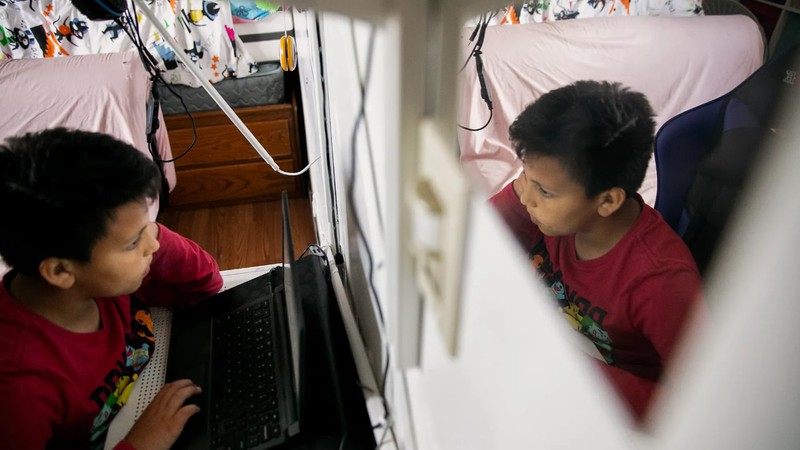A bill from a member of the Legislature’s happiness committee would require schools to come up with homework policies that consider the strain on students.

Mario Ramirez Garcia does homework on April 23, 2021. Photo by Anne Wernikoff, CalMatters
Update: The Assembly education committee on April 24 approved an amended version of the bill that softens some requirements and gives districts until the 2027-28 school year.
Some bills before California’s Legislature don’t come from passionate policy advocates, or from powerful interest groups.
Sometimes, the inspiration comes from a family car ride.
While campaigning two years ago, Assemblymember Pilar Schiavo’s daughter, then nine, asked from the backseat what her mother could do if she won.
Schiavo answered that she’d be able to make laws. Then, her daughter Sofia asked her if she could make a law banning homework.
“It was a kind of a joke,” the Santa Clarita Valley Democrat said in an interview, “though I’m sure she’d be happy if homework were banned.”
Still, the conversation got Schiavo thinking, she said. And while Assembly Bill 2999 — which faces its first big test on Wednesday — is far from a ban on homework, it would require school districts, county offices of education and charter schools to develop guidelines for K-12 students and would urge schools to be more intentional about “good,” or meaningful homework.
Among other things, the guidelines should consider students’ physical health, how long assignments take and how effective they are. But the bill’s main concern is mental health and when homework adds stress to students’ daily lives.
Homework’s impact on happiness is partly why Schiavo brought up the proposal last month during the first meeting of the Legislature’s select committee on happiness, led by former Assembly Speaker Anthony Rendon.
“This feeling of loneliness and disconnection — I know when my kid is not feeling connected,” Schiavo, a member of the happiness committee, told CalMatters. “It’s when she’s alone in her room (doing homework), not playing with her cousin, not having dinner with her family.”
'I feel that I should teach them what I need to teach them when I’m with them in the room.'
Casey Cuny, California Teacher of the Year
The bill analysis cites a survey of 15,000 California high schoolers from Challenge Success, a nonprofit affiliated with the Stanford Graduate School of Education. It found that 45% said homework was a major source of stress and that 52% considered most assignments to be busywork.
The organization also reported in 2020 that students with higher workloads reported “symptoms of exhaustion and lower rates of sleep,” but that spending more time on homework did not necessarily lead to higher test scores.
Homework’s potential to also widen inequities is why Casey Cuny supports the measure. An English and mythology teacher at Valencia High School and 2024’s California Teacher of the Year, Cuny says language barriers, unreliable home internet, family responsibilities or other outside factors may contribute to a student falling behind on homework.
“I never want a kid’s grade to be low because they have divorced parents and their book was at their dad’s house when they were spending the weekend at mom’s house,” said Cuny, who plans to attend a press conference Wednesday to promote the bill.
In addition, as technology makes it easier for students to cheat — using artificial technology or chat threads to lift answers, for example — Schiavo says that the educators she has spoken to indicate they’re moving towards more in-class assignments.
Cuny agrees that an emphasis on classwork does help to rein in cheating and allows him to give students immediate feedback. “I feel that I should teach them what I need to teach them when I’m with them in the room,” he said.
Assemblymember Pilar Schiavo, far left, and other members of the Select Committee on Happiness and Public Policy Outcomes listen to speakers during an informational hearing on at the California Capitol in Sacramento on March 12, 2024. Photo by Fred Greaves for CalMatters
The bill says the local homework policies should have input from teachers, parents, school counselors, social workers and students; be distributed at the beginning of every school year; and be reevaluated every five years.
The Assembly Committee on Education is expected to hear the bill Wednesday. Schiavo says she has received bipartisan support and so far, no official opposition or support is listed in the bill analysis.
The measure’s provision for parental input may lead to disagreements given the recent culture war disputes between Democratic officials and parental rights groups backed by some Republican lawmakers.
Because homework is such a big issue, “I’m sure there will be lively (school) board meetings,” Schiavo said.
Nevertheless, she says she hopes the proposal will overhaul the discussion around homework and mental health. The bill is especially pertinent now that the state is also poised to cut spending on mental health services for children with the passage of Proposition 1.
Schiavo said the mother of a student with attention deficit/hyperactivity disorder told her that the child’s struggle to finish homework has raised issues inside the house, as well as with the school’s principal and teachers.
“And I’m just like, it’s sixth grade!” Schaivo said. “What’s going on?”
Articles which extol the virtues of a report or article put out by a local newsroom.